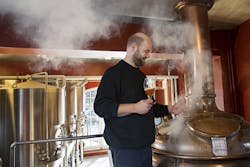DuPont has introduced a new enzyme able to reduce or completely eliminate diacetyl during beer fermentation.
The firm presented Alphalase Advance 4000 at the BrauBeviale 2015 brewers’ trade fair in Nuremburg, Germany, Nov. 10-12, calling it a “robust solution” that offers a shorter, consistent and more sustainable process for beer making.
According to the firm, the enzyme keeps beer quality high while optimizing production capacity and saving on energy consumption.
Diacetyl, a naturally occurring organic compound that is also present in butter, develops during beer fermentation.
However, the industry has faced a battle to remove the buttery off-flavor it produces, with brewers working to keep diacetyl levels low in the final beer.
To do this, they extend the maturation period of beer, ensuring that the diacetyl is broken down into flavor-neutral compounds once secondary fermentation is complete.
The problem for brewers has been predicting the rate of diacetyl reduction, which varies according to temperature, wort gravity, adjunct type and the level of free amino nitrogen (FAN), explained Iliana Yanez, global product manager of Brewing & Distilling Enzymes at DuPont Industrial BioSciences.
The new enzyme solves this issue by preventing the generation of diacetyl during fermentation. With levels kept safely below the accepted flavor threshold, brewers can shorten the maturation period significantly, obtaining a uniform maturation, optimizing production throughput and cutting down on the energy consumed in the process.
“Extensive tests have shown that Alphalase Advance 4000 is efficient across a broad spectrum of brewing protocols and adjuncts ranging from corn and rice to sorghum and cassava,” Yanez added.
